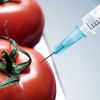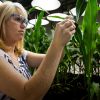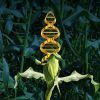-
 +27 +1
+27 +1Brazil Refuses GMO Imports From United States
Brazil joins the growing number of countries rejecting GMO imports from the United States. Brazil joins the growing number of countries rejecting GMO imports from the United States. In the last decade, bio-technology and gene modification in large-scale agriculture has become a controversy driving a wedge into the industry. In 2015, 19 European nations had declared a ban on GM crops, citing political, health and environmental concerns.
-
 +8 +1
+8 +1Doubts About the Promised Bounty of Genetically Modified Crops
The controversy over genetically modified crops has long focused on largely unsubstantiated fears that they are unsafe to eat. But an extensive examination by The New York Times indicates that the debate has missed a more basic problem — genetic modification in the United States and Canada has not accelerated increases in crop yields or led to an overall reduction in the use of chemical pesticides.
-
 +15 +1
+15 +1Bayer says clinches $66 billion Monsanto takeover
German drug and crop chemical maker Bayer clinched a $66 billion takeover of U.S. seeds company Monsanto on Wednesday, ending months of wrangling with a third sweetened offer that marks the largest all-cash deal on record. The $128-a-share deal, up from Bayer's previous offer of $127.50 a share, has emerged as the signature deal in a consolidation race that has roiled the agribusiness sector in recent years, due to shifting weather patterns, intense competition in grain exports and a souring global farm economy.
-
 +21 +1
+21 +1First GMO ever produced by genetic engineering poisoned thousands of Americans
The dangers of GMOs in the present day are the subject of much debate, but few can deny that the first genetically engineered (GE) products were truly dangerous. In fact, few people can talk about it at all, because most people have never even heard about these early products or the damage they caused. Alliance for Bio-Integrity executive director Steven M. Druker relayed this information is his book, Altered Genes, Twisted Truth: How the Venture to Genetically Engineer Our Food Has Subverted Science...
-
 +36 +1
+36 +1Zika virus: Floridians fear 'Pandora's box' of genetically altered mosquitos
The Florida Keys are three months away from a straw poll vote on whether to release millions of genetically modified mosquitoes on an island just east of Key West, and the tourist destination is awash in lawn signs. Alongside the typical signs to vote for court clerk, judge, sheriff or school board are signs that showcase the overhead view of a mosquito and read: “NO CONSENT to release of genetically modified mosquitoes”. For the last five years, the biotechnology company Oxitec has been developing a plan to experimentally...
-
 +29 +1
+29 +1107 Nobel laureates sign letter blasting Greenpeace over GMOs
More than 100 Nobel laureates have signed a letter urging Greenpeace to end its opposition to genetically modified organisms (GMOs). The letter asks Greenpeace to cease its efforts to block introduction of a genetically engineered strain of rice that supporters say could reduce Vitamin-A deficiencies causing blindness and death in children in the developing world.
-
 +23 +1
+23 +1GM food generally safe for humans and the environment, report says
Genetically manipulated food remains generally safe for humans and the environment, a high-powered science advisory board declared in a report on Tuesday. The National Academies of Science, Engineering and Medicine concluded that changing the genetics of what we eat does not produce the “Frankenfood” monster some opponents claim – but is not feeding the world with substantially increased yields, as proponents promised.
-
 +29 +1
+29 +1The Great GMO Cover-Up #2 Companies Hide Dangers; Attack Scientists
Biotech companies point to stacks of industry studies as proof that their genetically engineered foods are safe. But their "proof," it turns out, is just "Tobacco Science"— research carefully designed to hide dangers. Independent studies, on the other hand, feature GMO-fed animals suffering from organ damage, tumors, endocrine and immune system dysfunction, and premature death.
-
 +25 +1
+25 +1CRISPR Is Going To Revolutionize Our Food System—And Start A New War Over GMOs
In five years, there might be a little CRISPR-edited corn in your breakfast cereal or CRISPR-edited wheat in your pasta. CRISPR'd tomatoes and CRISPR'd pork might follow. There's already a little CRISPR in your yogurt. It's not hyperbolic to say that CRISPR-Cas9—new technology that makes it possible to quickly and easily edit DNA—is changing the future of food. The method could eventually be used to tweak almost anything we eat, selecting traits that can make agriculture more environmentally...
-
 +20 +1
+20 +1Growing Doubt: A Scientist's Experience of GMOs
''I now believe, as a much more experienced scientist, that GMO crops still run far ahead of our understanding of their risks.''
-
 +20 +1
+20 +1Why People Oppose GMOs Even Though Science Says They Are Safe
Intuition can encourage opinions that are contrary to the facts. That, and it's hard to shake labels like frankenfood.
Submit a link
Start a discussion




















